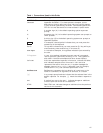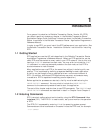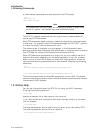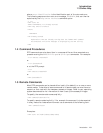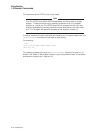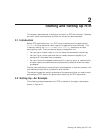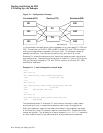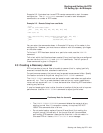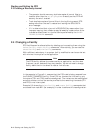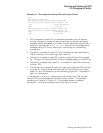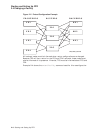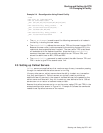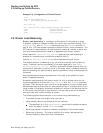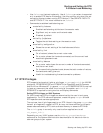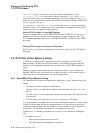
Starting and Setting Up RTR
2.2 Setting Up—An Example
Example 2–2 illustrates how to use RTR remote commands to start the same
configuration. The
set environment
command is used to send subsequent
commands to a number of RTR nodes.
Example 2–2 Remote Setup from one Node
% rtr
RTR> set environment/node= -
_RTR> (FE1, FE2, FE3, TR1, TR2, BE1, BR2, BR3)
RTR> start rtr
RTR> create facility funds_transfer/frontend=(FE1, FE2, FE3) -
_RTR> /router=(TR1, TR2) -
_RTR> /backend=(BE1, BE2, BE3)
You can enter the commands shown in Example 2–2 on any of the nodes in the
configuration. However, you must have an account with the necessary privileges
on the other nodes.
To find out if RTR has been started on a particular node, use the
SHOW RTR
command.
To find out which facilities have been created (if any) and how they are configured
you can use the
SHOW FACILITY
and
SHOW LINK
commands. The full syntax of
these commands is given in Chapter 6.
2.3 Creating a Recovery Journal
RTR writes data to journal files to be able to recover (that is, replay) partially
executed transactions after a backend node failure.
For performance reasons, the journal may be spread across several disks. Specify
the location and size of the journal using the
CREATE JOURNAL
command.
The
CREATE JOURNAL
command must be issued on each node where an application
server will run. That is, on each backend node and on any router nodes where
router call-out servers will run. It must be issued after installing RTR and before
creating any facilities.
It may be issued again later to alter the size or location of the journal to improve
performance. Use the
MODIFY JOURNAL
command to adjust journal sizes.
Cautionary Note for Journals
• The
CREATE JOURNAL/SUPERSEDE
command deletes the contents of any
existing journal files. If transaction recovery is required, DO NOT
ISSUE this command after a failure.
• Do not make backup copies of journal files without first making the
original journal file read-only or the journal files will be considered
spurious by RTR because it sees journal files that it did not create. In
this case RTR will issue a
%RTR-F-SPUJOUFIL
error message.
Starting and Setting Up RTR 2–3



